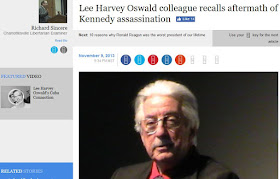Lee Harvey Oswald colleague recalls aftermath of Kennedy assassination
November 9, 2013 9:34 PM MST
Wesley Buell Frazier drove Lee Harvey Oswald to work at the Texas Book Depository on the morning of November 22, 1963. That was a day that changed his life, he said in an interview at the 2013 Virginia Film Festival on November 9. “That young boy who went to work that day, he has never come home.”
Frazier spoke to the Charlottesville Libertarian Examiner after a screening of a new documentary, The Kennedy Half-Century, co-produced by the Center for Politics at the University of Virginia. He had participated in a panel discussion along with UVA political scientist Larry Sabato and another witness to the Kennedy assassination, Tina Towner Pender.
Just 19 years old in November 1963, Frazier had to endure a brutal interrogation by the Dallas police, who accused him of being part of the assassination plot.
'Innocent until proven guilty'
The police interrogator, he said, “wanted me to admit to being part of the assassination and I told the guy, 'I'm not doing that.' I said, 'That's ridiculous.'”
He added: “In this country, you're supposed to be innocent until proven guilty but a lot of times you're guilty until proven innocent and our forefathers didn't intend for our country to be like that.”
During the panel discussion, Frazier explained that he had often driven Oswald from suburban Dallas to the book depository. Oswald's Russian-born wife, Marina, lived near Frazier's sister, while Oswald rented a room in the city. Normally, they carpooled only on Friday evenings and Monday mornings, and Frazier had pointed out to Oswald how it was odd he would need a ride on Friday morning.
That Friday turned out to be “a day like I've never seen before. I hope I never see one [like it] again,” Frazier said.
“It's a day that changed my life. I've never been the same. That young boy who went to work that day, he has never come home. For many years I wouldn't talk to anybody about any of it because I was so scared about what they might do to my family. There's some evil people in this country and when it comes to power and money they will do anything.”
The police interrogator handed Frazier a pre-typed confession and told him to sign it.
“I started reading it,” he explained. “It said I knew about and was part of the assassination, and I said, 'That's totally false. I'm not going to sign that.'”
Police brutality
That response made the police officer angry, Frazier recalled.
“When I wouldn't sign he drew back his hand to hit me. Matter of fact, he was standing just like you're standing there, and I put my arm up like this” – he raised his hand above his head – “to block, to keep him from striking me.”
The officer “got so mad when I told him, 'I'm not signing that,' and I told him, 'There's [another] policeman outside this door but before they get in here, you and I are going to have a hell of a fight. I'm going to get some good licks on you.'”
Reflecting on that moment, Frazier said, “For one time in my life, I think I scared the hell out of a man because I turned the tables on him – because that's what he did” as a matter of routine.
That policeman, he said, “badgered and beat on people to make them sign confessions and he found a kid who wasn't scared of him. I think it scared the hell out of him.”
Even though Frazier was “a young 19” at the time, that interrogating officer “didn't know what I had been through before I got there,” which heightened the tension in the room.
Publisher's note: This article was originally published on Examiner.com on November 9, 2013. The Examiner.com publishing platform was discontinued July 1, 2016, and its web site went dark on or about July 10, 2016. I am republishing this piece in an effort to preserve it and all my other contributions to Examiner.com since April 6, 2010. It is reposted here without most of the internal links that were in the original.

No comments:
Post a Comment